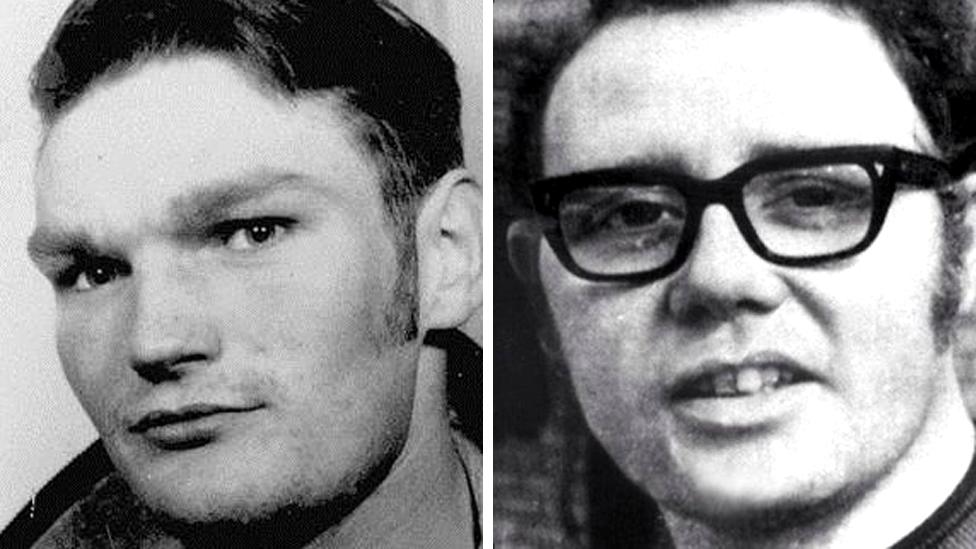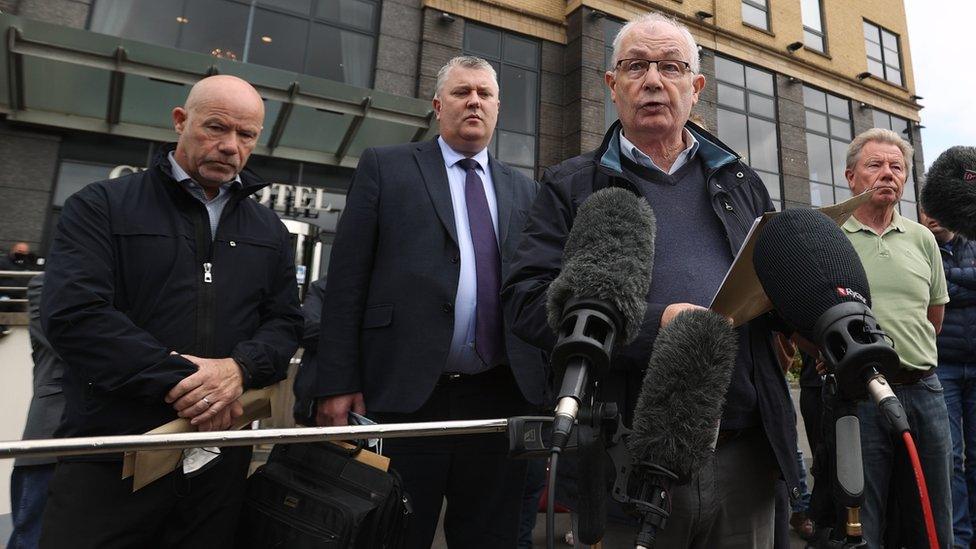Naomi Long: NI legacy prosecutions should proceed 'where evidence allows'
- Published

The test used for the soldier F and B case "does not extend to the full gamut of legacy cases", says Naomi Long
The decision to drop murder cases against two ex-British soldiers does not mean future legacy prosecutions should not go ahead, NI's justice minister has said.
Naomi Long's comments come after it emerged that two Army veterans facing murder charges from the Northern Ireland Troubles will not face trial.
The cases involve individuals known as Soldier F and Soldier B.
Soldier F was to be prosecuted over two deaths on Bloody Sunday.
The case against Soldier B related to the death of 15-year-old Daniel Hegarty, who was shot twice in the head in Londonderry in July 1972.
Mrs Long said she could not comment on the decisions but added that the families of William McKinney, James Wray and Daniel Hegarty have the right to seek a review.

James Wray and William McKinney were among 13 people shot dead at a civil rights march on Bloody Sunday
She told BBC's Sunday Politics programme that she had "huge sympathies" and that it had been a "traumatic and distressing time for them".
Mrs Long rejected suggestions that Friday's events meant that an alternative was needed in how Troubles-era legacy cases are handled.
She said the detailed statement from the Public Prosecution Service (PPS, external), referring to another case in which the murder trial of two other Army veterans collapsed, shows that is not the case.
'Does not extend to the full gamut of cases'
"This (the PPS' decision) related to an earlier judgement on admissibility of evidence that was made in regard to soldiers A and C," she said.
"The consequences of that were that the admissibility of evidence with respect to soldiers F and B was also then judged inadmissible.
"The PPS had a duty to review those cases, as much of the evidentiary detail would have been similar.
"That is the reason why it no longer meets the test for prosecution," she explained.
However, she added: "That pertains to a small period of time between 1971 and 1973 when soldiers who discharged their weapons were compelled to give a statement to the Royal Military Police.
"They were not interviewed under caution and the RUC (Royal Ulster Constabulary) were not able to interview them under caution. Because of the fact that they essentially self-incriminated in a compelled statement, it made that evidence inadmissible."
She said that meant those circumstances do "not extend to the full gamut of legacy cases".
"It should not be read across more widely than those cases to which it pertains," she said.
'Clarity needed' on legacy talks
Mrs Long said that it had always been known there was a "limited number of historic cases" that would be able to be successfully prosecuted.
This, she said, was due to the passing of witnesses, the processes at the time and the lack of evidence.
"That does not equate to justifying saying that no case, even were there are all those things in place, should be able to make its way to the courts," she said.
She also discussed the upcoming legacy talks announced by the Northern Ireland Office (NIO) last week.
Allow X content?
This article contains content provided by X. We ask for your permission before anything is loaded, as they may be using cookies and other technologies. You may want to read X’s cookie policy, external and privacy policy, external before accepting. To view this content choose ‘accept and continue’.
"It's not clear what the basis for these talks is. We need clarity on that. We have already gone through this process and arrived at the Stormont House Agreement," she said
"It's important we uphold the rule of law. It is right where the evidence is available and the prosecutorial bar is met, that people should have access to justice."
You can catch up on the latest episode of Sunday Politics Northern Ireland on the iPlayer for the next 30 days.
Related topics
- Published2 July 2021

- Published2 July 2021
